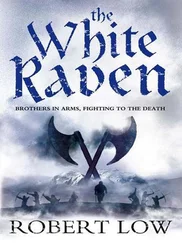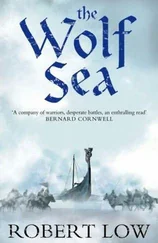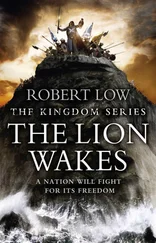Atil's howe. A mountain of treasure. She had known after all, it seemed, and the realisation of that made me shiver—for how could she have led us so unerringly to this unmarked, unknown place? How could anyone have done that and still be like the rest of us?
I watched her sitting upright in front of those two stones and that cleft, which was like the dark invite of a woman's body. Her hair floated in the wind, a dark snake-crown, and, even with her back to us all, she exuded something that made the fear rise in you like old mead fumes. She sat there all night, was still there in the morning, she had not moved.
Did not move, until the horsemen swept on us.
Einar had split us, sensibly enough. There were those to guard and we wore all our gear, while those digging had stripped to the waist and were hacking away at the earth. A cart was being broken up, so that the wood could be used as shoring, for we had no clear idea of how much we'd have to dig to break in.
The drumming of hooves brought all heads up. The diggers ran for the cover of the carts; those on guard hefted their weapons. Of the twenty, about half knew how to use a bow and were nocking arrows.
But they also had mail and fat padded arms, all of which made drawing and loosing accurately a nightmare.
The horsemen swept down the balka in a cloud of dust, without any shouts or cries. They skidded at full tilt down the slopes we had taken ages to traverse, shooting arrows as they came.
I heard them thud into the earth around me. One hissed over my head. Another smacked my shield boss with a clang and dropped to the ground.
They were true steppe warriors, these, all sheepskins and wool hats and active as cats on those horses.
They didn't so much ride them as climb all over them, shooting their little arrows until they got close, then whipping out their light swords, darting them like snake-tongues at us from the other side of the horse, and swooping away before we could strike.
They swirled and whooped and vanished and appeared again in the dust until we were dizzy with it, whirling our heavy swords and axes at nothing.
A figure stepped out of our ranks into the dust.
`Hold!' yelled Einar. 'Don't let them drag you out into their killing ground.'
But it was Bagnose and he was past caring. He nocked, took aim, shot and a man pitched off. Walking forward, he nocked, took aim, shot and another horseman shrieked.
They saw him then and the arrows hissed. He took two full in the chest, staggering him. But he walked forward, nocked, took aim . . .
He had no mail, no padding, for he was an archer who took pride in it and never missed, wanted nothing to tangle his flights or string.
But Bagnose was already dead, though his legs and heart didn't know it and he was still roaring something when he fell.
We ignored Einar and went after him, of course—it was Bagnose, after all—charging into the dust, screaming. But by then the horsemen had thundered off and all we could do was drag back the corpse, studded with arrows.
`Like a hedgepig,' said Flosi mournfully. Out on the slope of the balka, though, six corpses lay, each killed with a single shot.
`What was he shouting?' asked Valknut, who had been one of the diggers.
`He wasn't shouting,' answered Einar softly. 'He was making verses. On his own death. A good song, but only he knows it.'
Òdin's balls,' Valknut growled, shaking his head. 'The cost of seeing them off was high.'
À test?' Ketil Crow hazarded, wiping his streaming face. `To see how good we are?'
`Now they know,' spat Wryneck with a brief twitch. 'Six for one.'
`Let's hope the price is too high for them,' I offered.
Of course, it wasn't. But they waited until the next day to try to wipe us out.
We dug feverishly, well into the night, taking it in turns to stand guard or swing a pick, so that no one got any real rest. Valknut and Illugi Godi did their own digging, another boat-grave for the animals to dig up, while Hild sat and watched us, perched on a wagon-trace with her knees at her chin. She reminded everyone of a carrion crow.
It was Valknut who speared the first of the treasure, with the very last hack of a mattock, dragging earth back out of the hole we had made between the stones.
He held up what he had found, scraping the dirt off and, in the red glow of a torch, something gleamed.
He spat, polished it and the flash of silver shone. We all gawped.
Einar took it from him, turning it this way and that. 'A bowl,' he hazarded. 'Or a plate, flattened and bent.
Good workmanship, though.'
Ìt's silver, right enough,' breathed Valknut and would have gone back in, save that the stretch he had cleared out needed roof supports and it was too dark to see properly to put them in. The tunnel we had dug was six foot long, three high and leaking loose dirt like water because we were using wood sparingly; we needed all the carts to carry our haul away in.
All night long the men turned that bent semi-circle of age-black silver to and fro, cleaned it, marvelled at it, discovered the delicate border of leaves and fruit, birds in flight and even bees, all embossed in the silver in perfect little portraits.
Sighvat studied it with interest and said, `Those are the dreams of birds.'
`You and your birds,' growled Valknut. `What do they dream of?'
`Songs, mostly,' Sighvat replied seriously, then wagged a finger at Valknut. 'If we scorn the wisdom of birds and beasts, we fool only ourselves.'
`What wisdom?' asked Wryneck, curious now, while he smoothed the notched edge of his sword back to sharpness in a comforting, rhythmic rasp of whetstone.
`Well,' said Sighvat, considering. 'Bees know when fire is coming and will swarm. Hornets and wasps know the very tree that Thor will hurl his hammer at. And a frog is better at being a frog than a man.'
We chuckled at that, but Sighvat merely shrugged and said, 'Could you live naked in a pool all winter and survive?'
`What else?' demanded Wryneck, for this was decent compensation for the sad lack of Bagnose's wit.
`My mother could speak with birds and some beasts,' said Sighvat, 'but never could teach it to me. She told me hedgepigs and wasps will not spy for anyone, but woodpeckers and starlings can be persuaded to tell what they know. And most hawks hate autumn.'
`Why?' demanded Einar, suddenly interested. 'I have hunted a hawk in autumn, but it never does well and I have always wondered why that is.'
`You should have had someone like my old mum ask it,' Sighvat replied. 'But it is simple enough. Here is a bird that hangs in the air, looking for the least little movement on the ground, which is its supper. And there are thousands of blowing leaves.'
Einar stroked his moustaches thoughtfully and nodded.
Valknut waved a dismissive hand, adding: `That's just . . . sense.'
`You did not know it,' Sivhgat pointed out and Valknut fumed, having no answer to that.
'And,' I said, half dreamily, 'you never see a cat on a battlefield.'
There was an amazed silence for a moment, then Sighvat grinned. 'Exactly—you know a thing or two, young Orm.'
Àll I know is that this'—Valknut held up the battered silver—'is a sign that riches lie in that hill.'
`Just so,' declared Einar with a slight smile, 'and here's something for you to think on. Riches are like horse shit.'
We looked at each other. Some shrugged; no one could understand it and more than a few, never having heard him do it before, were not sure if Einar was making a joke.
Einar grinned. 'They stink when they are in a heap in someone else's patch, but make everything fruitful when spread about.'
And we laughed and felt almost like the old brotherhood, sitting by the fire, fretting for light so we could get back to digging.
Читать дальше
Конец ознакомительного отрывка
Купить книгу











